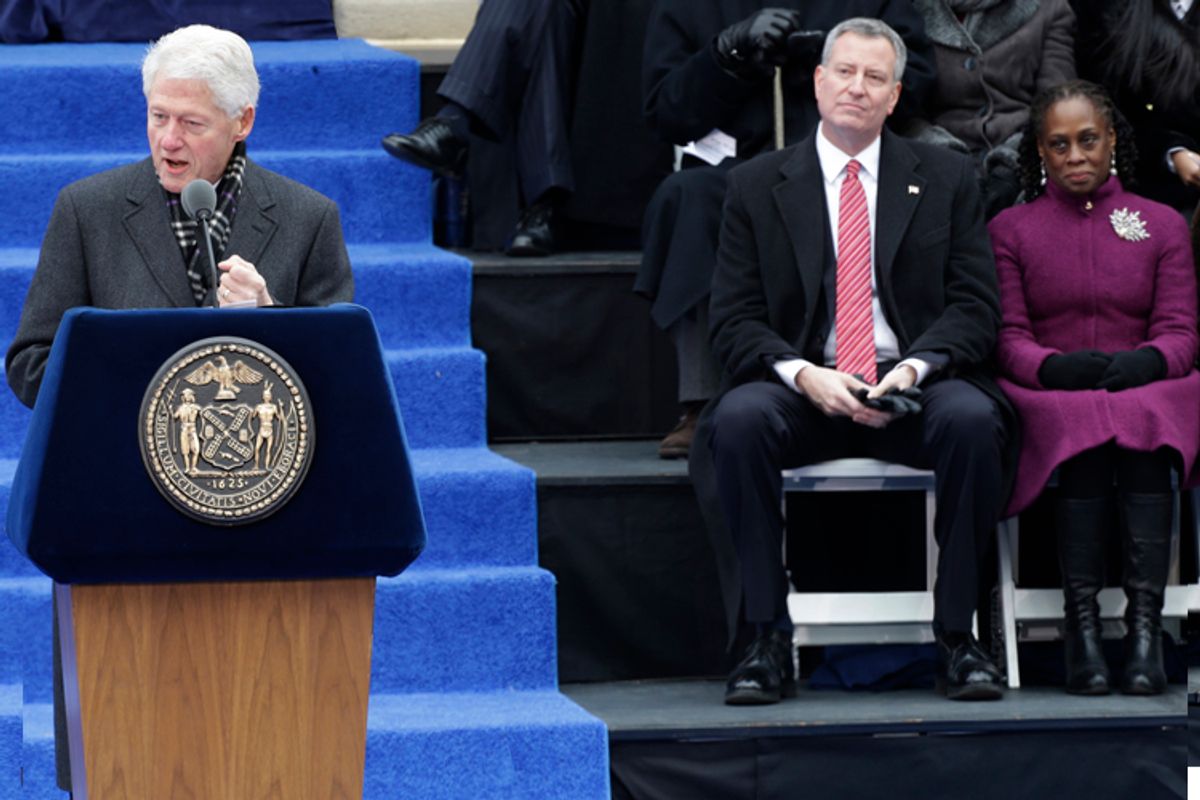It’s supposed to be a new year, 2014, but does anyone else feel like it’s 2007? The one big national political story that broke over the holiday, the inauguration of progressive New York Mayor Bill de Blasio, is mostly being hyped for what it tells us about Hillary Clinton’s presidential hopes. Haven’t we done this already?
Seven years ago, the nation’s politics got pulled into a sinkhole of analyzing every political development and every political leader in terms of its relationship to Clinton’s candidacy. She was up, she was down; she can’t win; she’s invincible; she’s rallied major leaders behind her; major leaders are abandoning ship; she’s intimidating newbie Barack Obama; Obama has her on the ropes. That last story turned out to be true, eventually.
Now it’s de Blasio’s turn to see his innovative administration reflected in Clinton’s glory, almost three years before 2016 and before she’s even announced her candidacy. Politico covered “The Clinton-De Blasio political marriage” before the inauguration. The day after, the Washington Post’s Dan Balz asked: “Is New York’s De Blasio prompting a political repositioning by the Clintons?”
Balz summarized Hillary Clinton’s alleged dilemma thusly:
Will she be able to be true to the New Democrat ideals that brought her husband to power and also accommodate the energy pulsing through the party’s progressive wing?
But Balz’s coverage, and that of a lot of other reporters, presumes both Clintons’ political views are preserved in amber, with Hillary’s headbands, perhaps. In fact, all of the parties in this "marriage" have evolved politically over the years. Bill and Hillary Clinton cut their teeth in the George McGovern campaign. They opposed the Vietnam War and supported civil rights; they stood firmly on their party’s left. Bill de Blasio supported the Sandinista revolution in Nicaragua – and then went to work for the Clinton administration. All three of them have moved from the left to the center, de Blasio arguably least of all.
The Clintons’ embrace of de Blasio, or his of them, isn’t surprising in any way. He worked, under Andrew Cuomo, in Clinton’s Department of Housing and Urban Development. When Hillary Clinton ran for Senate from New York, he was her campaign manager, although in truth he shared power with a lot of other Clintonland potentates. Now the Clintons run a global foundation in de Blasio’s city. Frankly, I can imagine Clinton swearing in virtually any Democrat who became New York’s mayor.
A lot of the coverage exaggerates the gulf between the Clintons’ political views and de Blasio’s. The new mayor has already disappointed some on the left by appointing Rudy Giuliani’s police commissioner, Bill Bratton, and making Goldman Sachs' Alicia Glen in charge of his housing policy. De Blasio was never as far left as Rupert Murdoch’s New York Post would have you believe.
Clinton’s “New Democrat ideals,” as referenced by Balz, were time- (and to a degree, place-) specific: the aftermath of the Reagan revolution, when Democrats had been devastated in the South and among white working-class voters, and had lost the White House in four out of five elections. It is not to embrace all of Clinton’s slick maneuvering on race, crime and welfare to say some of it was a reasonable political course correction: Clinton engaged with the notion that while government should correct the excesses and inequities of the market, the market might have something to teach government, too. (It turned out to be much less than he thought.)
I’ve written before, many times, that both Clintons are too close to Wall Street for my taste. But Bill Clinton has always been someone who tries to bridge progressive and centrist Democrats, which is how he won in 1992. It is no surprise that he would welcome a chance to align himself with what de Blasio represents in 2014. “I strongly endorse Bill de Blasio’s core campaign commitment to shared opportunities,” Clinton declared at the inauguration, “and this inequality problem bedevils the entire country.”
Certainly Hillary Clinton needs to reckon with the wave of economic populism de Blasio represents. I believe she can, and I assume she will. But if she makes preschool education a core of her candidacy, well, that’s not borrowing from de Blasio (who made universal pre-kindergarten a core platform of his campaign). Clinton was the chair of the board of the Children’s Defense Fund in the 1980s and has always been an advocate of publicly funded early childhood education. If Clinton chooses to make the most of this populist moment, she can look to her own past as well as her future.
Both the left and the right manage to caricature the Clintons as soulless political opportunists. I see them as good politicians with mostly progressive values who will run as far to the left as they think leaves them electable. That describes de Blasio, too. I’d have been more surprised if the Clintons hadn’t been center stage on the new mayor’s big day.

Shares